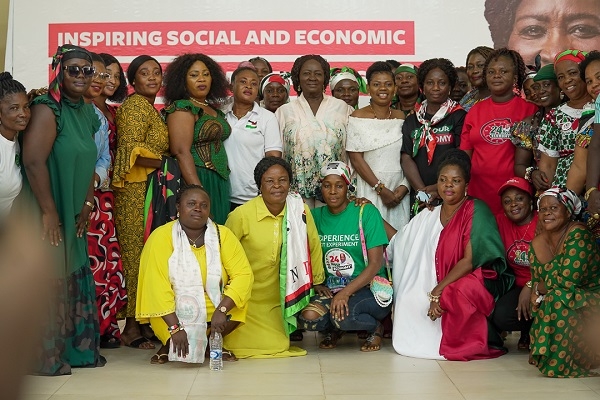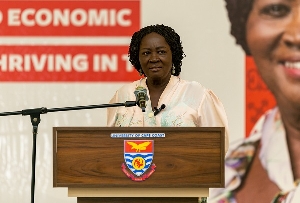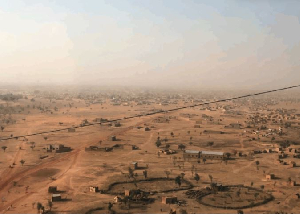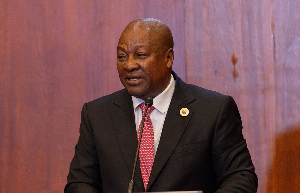Professor Naana Jane-Opoku Agyemang, the running mate of the National Democratic Congress (NDC) in the upcoming elections, has noted that among many benefits, implementing the 24-hour economy policy holds promising prospects that will empower women and drive economic growth in communities.
She was speaking on the theme "Inspiring Social and Economic Inclusion: Women Thriving in the 24 Economy" at the University of Cape Coast ahead of 2024 International Women’s Day.
Professor Naana-Opoku Agyemang revealed that the NDC has other progressive policy proposals targeting women in the 24-hour economy, which will be made known when the 2024 NDC manifesto is launched.
“The good thing about this economic revolution is that Ghanaian women have been
deliberately factored in and included in the policy. We do not have any option but to adapt quickly to help keep our young men and women employed. It is for this reason that H.E. John Dramani Mahama and the NDC are prepared to safeguard women’s safety and encourage gender-friendly labor regulations and work environments to support us (women) to thrive in the 24-hour economy,” she stated.
She noted that markets are the link between manufacturers and consumers, which is why John Dramani Mahama is still emphatic on continuing the market modernization programme that began in Kotokoraba, Cape Coast, and Kejetia Market, among other places.
“It is in this light that the next NDC government promises to give an ultra-modern facelift to all our major markets as active enablers of an efficient 24-hour economy,” she added.
She lamented that the “current socio-economic situation of Ghana continues to expose women to exclusion, discrimination, gender-based violence, and harassment in an economy that has been deliberately redesigned by those currently in charge to serve their selfish interests while at the same time working against our collective aspirations and welfare.”
Widen employment scope and inclusion:
She said John Dramani Mahama’s 24-hour economy policy is about “the Ghana where all of us thrive and where all persons of working age have a fair opportunity to work, man or woman. A productive economy that works around the clock to engage the skills and talents of our young people for sustainable development.”
With a meticulously planned implementation strategy, she believes the policy will introduce flexibility, providing avenues to integrate individuals currently outside the labour force but who are available to work.
She emphasised that the policy will promote inclusivity, ultimately leading towards achieving economic independence.
She also expressed concern over the mass exodus of Ghana’s youth in search of better opportunities abroad, highlighting that a significant portion of Ghana’s highly educated, trained, and skilled workforce comprises individuals leaving the country.
“As the difficulty in getting decent jobs that are sustainable and provide income security heightens, we have witnessed young women and men in the banking sector wake up suddenly to no jobs due to the current government’s poor economic decisions. Young people and women have been waiting for far too long to get jobs after training, and there is a growing fear that if nothing urgent is done, they will only be waiting forever to get employed,” she lamented.
International Women’s Day:
She noted that this year’s theme, "Inspiring Inclusion," perfectly underscores the unending and restless campaigns and advocacy anchored on the long-held values of deliberate involvement and participation by women in the socio-political and economic decision-making processes.
She commended all the various gender-based civil society organisations, progressive individuals, and stakeholders in the country who have been at the forefront of the campaigns and advocacy seeking to realise a society that thinks about, involves, and cares for women.
Stepping up the 24-hour conversation:
During a panel discussion, a professor of finance at UCC, John Gatsi, described the 24-hour economy as an intentional policy that could tackle economic challenges.
He stressed the importance of individuals who will be involved in this economy honing competitive and market-saving skills, given the less competitive production levels domestically.
Additionally, Prof. Gatsi underscored the need for leadership development, particularly among women, whose activities require scaling up within the 24-hour economy framework.
He emphasised that this shift presents an opportunity to focus on uplifting women and ensuring inclusivity.
“We need to continue to stay in the discussion about the 24-hour economy because if you don't earn income, you cannot comfortably participate in the digital economy. So, we need a policy that will govern every effort of the country to increase the productive capacity of the country, providing jobs for the people,” he said.
Bashiratu Kamal, a gender specialist with the trade union, emphasised the importance of examining consumption patterns and existing markets to ensure the sustainability of the 24-hour economy policy.
She suggested focusing on sectors of the economy with higher female employment rates and assessing the viability of the 24-hour economy for women in areas where their representation is lacking.
Prof. Akua Britwum, a professor of labor and human resource studies at the University of Cape Coast (UCC), emphasised the need for concerted efforts to eradicate stereotypes and discrimination women face across various sectors.

Press Releases of Monday, 11 March 2024
Source: Yadaba













